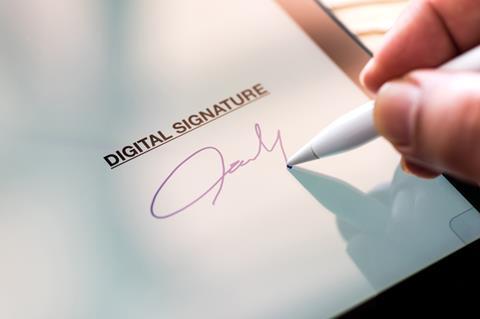HM Land Registry has revealed it is close to publishing draft guidance on a more sophisticated form of electronic signature that will not require a witness in a conveyancing transaction. However, witnessed electronic signatures are here to stay for at least another couple of years.
Land Registry began accepting witnessed electronic signatures to execute deeds in July, removing the last strict requirement to print and sign a paper document in a property transaction. Chief executive Simon Hayes said at the time that Land Registry would next turn its attention to ‘the more sophisticated’ qualified electronic signatures.
In a blog last week, general counsel Mike Harlow said Land Registry was ‘close’ to having draft practice guidance for qualified electronic signatures. These do not require a witness because the process has an embedded check within it, the output is encrypted and it works to a regulated standard.

However, Harlow said: ‘While we do believe they are likely to be a success, the identity processes within them are still developing and their use with consumers in our property market is obviously untested. They may initially suit some types of conveyancer more than others.
‘So, our intention is to work with the sector to bring them in as an option as soon as possible, but with the expectation that they will be used alongside witnessed electronic signatures for some time to come. We will at some point review the use of witnessed electronic signatures, but not until qualified electronic signatures have shown how they perform in practice for the various different uses within the property market. That may take some time – possibly a couple of years or more.
‘In the meantime, we will continue to support the growing use of both types of signature, as a cornerstone of a more resilient and digital conveyancing process.’
The ‘mercury approach’ for signatures - which allows for a signature page to be signed in pen in the physical presence of a witness – remains as another way of completing a deed.



























9 Readers' comments